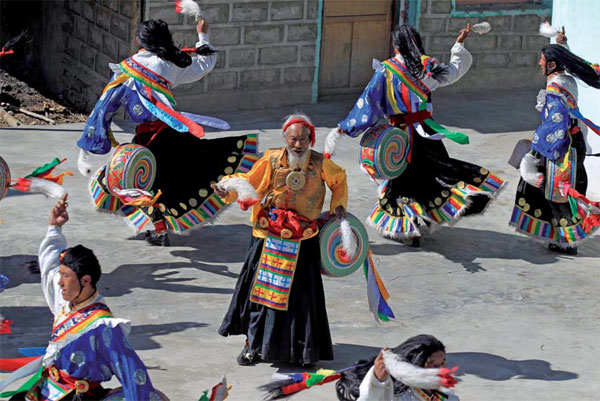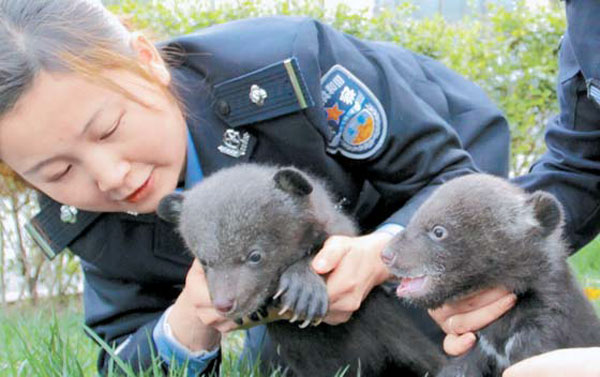What's news

| Residents perform the 1,300-year-old Jiuhezhuo Dance in Qiongjie, the Tibet autonomous region, on March 30. The dance, an ancient art form hailed as the living fossil of traditional Tibetan culture, was selected as a State-level intangible cultural heritage in July. Zhu Xingxin / China Daily |
Watchdog reboots study on green GDP
China has resumed research on green GDP and plans to start pilot projects next year, according to the nation's environmental watchdog.
Green GDP is an economic growth index that quantifies and measures the monetary costs of environmental damage caused by a country's economic growth.
China's move follows a call by the top leadership to improve GDP, said Li Qingrui, head of the Ministry of Environmental Protection's policy bureau.
The revised Environmental Protection Law, which took effect this year, requires local governments to take responsibility for the environment. This is also a reason for the ministry to restart research on green GDP, Li said.
China first published green GDP data for 2004 two years later, but research on how to compile green GDP has been suspended since then.
An application system for green GDP will be established along with detailed technical specifications for the new index by the end of this year. Pilot cities will then adopt the green GDP in 2016 and 2017 to test the research.
China launches its latest Beidou satellite
China launched a new-generation satellite into space on March 30, starting the expansion of its indigenous navigation and positioning network to global coverage.
The satellite, the 20th for the Beidou Navigation Satellite System, was sent into orbit by the Yuanzheng-1 upper stage vehicle after being lifted by a Long March-3C carrier rocket from the Xichang Satellite Launch Center in Sichuan province.
The launch is the first step in China's plan to turn the navigation system's current regional service into global coverage, according to the center.
China launched the first Beidou satellite in 2000. The system began providing positioning, navigation, timing and short-message services to civilian users in China and surrounding areas in the Asia-Pacific region in December 2012. Currently, the system consists of 15 satellites.
The latest satellite will test a host of new technologies, including a navigation signaling mechanism and advanced links between satellites.
Dozens of unlawful golf courses closed
Authorities have shut down more than 60 golf courses since last summer as part of a renewed campaign against the destruction of land and water resources, according to China's top economic planning authority.
The National Development and Reform Commission said on March 30 that the crackdown on illegal golf courses has achieved positive results since July.
The commission also published a list of 66 golf courses built in contravention of rules designed to protect arable land and save water, including three in Beijing, six in Guangdong province and four in the Inner Mongolia autonomous regions.
It added that all governments have now banned the building of golf courses, and reclamation work on existing ones to restore the land's original condition has been an initial success.
New round of 'Fox Hunt' begins
The Ministry of Public Security has launched a new round of its campaign called Fox Hunt 2015 to track down corrupt Chinese officials who are still at large overseas, the ministry said on March 31.
The renewed campaign starts on Wednesday and will last until the end of December, according to the ministry.
"We will focus on nabbing corrupt officials or suspects with duty-related crimes who fled to major Western countries, including the US, Canada and Australia," said the ministry.
The ministry will work closely with the People's Bank of China and the State Administration of Foreign Exchange to monitor the suspicious flow of funds remitted to foreign accounts, according to the statement. The ministry will also enhance supervision over offshore companies and crack down on underground banks to prevent suspects from illegally transferring proceeds abroad.
Illegal foreign workers in province soar
Law enforcement officers investigated more than 5,000 illegal foreign workers in Guangdong province last year.
Most had no work or residence permits and were employed mainly in labor-intensive industries in the prosperous Pearl River Delta region, where there is a major shortage of workers, Guangzhou Daily reported.
Most were born in the 1980s and 1990s and came mainly from neighboring Southeast Asian nations, the newspaper said.
The number of illegal foreign workers in the province has been rising in recent years. Dongguan, a major production center, investigated 400 foreign illegal workers in 2013, but the figure doubled to more than 800 last year.
In Zhongshan, local police investigated 278 cases involving 957 foreign workers who illegally entered the mainland, overstayed their visas or worked without permits last year - four times more than the figure recorded in the city in 2013.
In December, police investigated 53 illegal foreign workers at a shoe factory in the township of Daojiao in Dongguan after officers arrived unannounced for an inspection tour. The foreign workers accounted for more than 50 percent of the factory's 100 employees.
Textbooks showcase ancient traditions
A set of textbooks designed to help high school students learn about traditional Chinese culture will be published soon, Beijing Times reported on March 30.
The books are the first national-level works of their kind and have been developed by a working group that promotes traditional culture. They will be used by students from fall this year, the report said.
The set contains four classics from ancient times. Two of the works, Confucian Analects and Mencius, are for 10th-grade students, while the other two, Great Learning and Dao De Jing, will be used by 11th graders.
Students will study the full text of Dao De Jing, a Taoist classic written by philosopher Laozi during the Spring and Autumn Period (770-476 BC), and explore themes raised in the other books.
The initiative follows a series of steps the authorities have taken in recent years to spread and promote traditional Chinese culture on campus.
Cattle project helps locals escape poverty
Villagers in the Tibet autonomous region are being lifted out of poverty by an innovative cattle project.
The 259 households in Gyadrong, in Lhundrub county, jointly operate a milking center.
"The local government and the county's alleviation office together invested 3 million yuan ($488,900) in 2013 to establish a feeding base and purchase 312 head of cattle," said Yontan, director of Lhundrub's Science and Technology Bureau and head of the local animal husbandry and veterinary station.
"The 259 impoverished households were chosen to be the direct beneficiaries of the project."
The residents operate the farm as a team, and eight villagers are employed as cowherds.
Central bank eases curbs on homeowners
The Chinese leadership has decided to ease its housing credit policy to boost the property market.
The People's Bank of China cut the minimum down payment for second homes to 40 percent from 60 percent on March 30.
The bank said the policy is designed to improve the living standards of buyers who have not paid off their existing mortgage but are buying a second home.
The Ministry of Finance said in a separate statement on March 30 that it is easing taxation on home sales.
Sales tax on pre-owned homes sold two years or more after purchase will be canceled, the ministry said. Since 2011, owners selling homes within five years of purchase have had to pay such taxes.
Fugitive database to ease information sharing
Using a shared computer database, provinces and autonomous regions will be able to share new clues about corrupt officials who have fled overseas with the top anti-graft watchdog within 24 hours, the Communist Party of China Central Commission for Discipline Inspection said on March 30.
The database, which is accessible by both central authorities and local governments, was set up to record detailed information about fugitives suspected of graft, the commission says.
"Our main task is to collect the escaped corrupt officials' individual information and build solid evidence at home, rather than flying abroad to collect evidence," a commission official said, asking that his name not be used.
Local provinces and regions have been playing an essential role in providing clues about corrupt officials who have escaped abroad. Records can be updated quickly and supplementary evidence can be provided to the commission to assist in its manhunts.
Regulation targets judicial meddling
Chinese officials who meddle in judicial cases will soon find their names on a blacklist that leads to internal punishments or legal consequences, according to a new regulation.
The Communist Party of China Central Committee and the State Council outlined a host of measures on March 30 by which officials who interfere in judicial cases will be publicly named and held to account. It is the latest effort to ensure judicial independence and transparency.
The regulation stipulates that judicial personnel should faithfully record the whole process, no matter who is involved.
Violations include interceding for litigants, asking personnel handling cases to meet litigants or their defenders privately, or overstepping their authority to make suggestions on handling cases by means of hearing reports, holding coordination meetings or issuing circulars.
Chinese universities rise in world ranking
Two prestigious universities in China have moved up a world university ranking, which education experts said is a result of China's continuing efforts to improve higher education and make universities more attractive.
In the recently issued Times Higher Education World Reputation Rankings 2015, Tsinghua University moved to 26th place from 36th last year, and Peking University rose nine places to 32nd.
"This is a strong performance by China," Phil Baty, the list's editor, said. "Its two leading institutions have made gains in the reputation rankings, reflecting the country's commitment to developing world-class universities."
"China's growing stature should lead to further improvements, as a strong reputation helps universities to attract and retain more global talent and investment," he said.
Call to change higher education
Local tertiary institutions should cater to the economic and social needs of the community by focusing on their strengths, according to the president of Jilin University. "For universities, it is important that they work on their unique characteristics No single institution can cover all programs. We need to determine the various types of universities that can focus on research, teaching and technical areas," said Li Yuanyuan, who is also a deputy of the National People's Congress.
Li, said the country's stage of development calls for more technical expertise, and that he agreed with the central government's push for more universities to become vocational colleges.
| A forest police officer tends to two bear cubs in Tangjiahe National Nature Reserve in Sichuan province on March 31. Forest police seized the animals after intercepting a taxi for inspection at a toll station on March 19. Lei Yuandong / For China Daily |
(China Daily European Weekly 04/03/2015 page2)
Today's Top News
- Japan tempting fate if it interferes in the situation of Taiwan Strait
- Stable trade ties benefit China, US
- Experts advocate increasing scope of BRI to include soft power sectors
- New engine powers cargo drone expansion
- China to boost green industry cooperation
- Manufacturing PMI rises in November
































